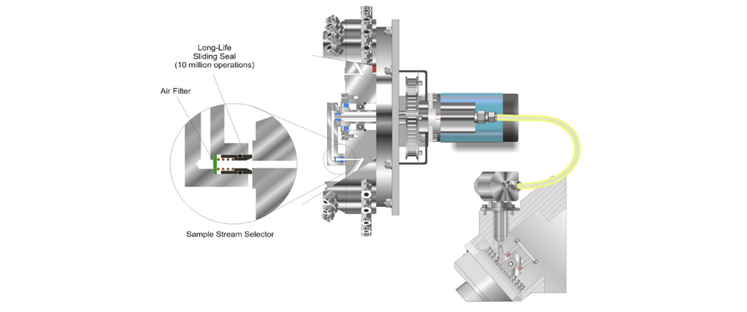The analysis of inbound and outbound gas streams is an ideal method to monitor nutrient conversion rates, detect unwanted by-products and determine the onset of poisoning.
This article discusses the benefits of online mass spectrometry based monitoring of gas streams to precisely control every stage of fermentation and cell culture processes.
Fermenters and bioreactors are indispensable tools in biotechnology. They serve as controlled environments to cultivate micro-organisms and the cells that are essential for various biotechnological applications; they provide optimal conditions to produce biobased products such as industrial enzymes, biofuels and therapeutic proteins.
Fermenters and bioreactors offer the precise control of parameters such as temperature, pH and nutrient supply, allowing the manipulation of cellular processes for genetic engineering and the development of novel bioproducts.
The process requires careful monitoring of the status of the culture; providing information about nutrient conversion rates and the health of the organisms to help to prevent the creation of unwanted by-products.
This assessment can be done by analysing the respiratory gases entering and leaving the fermenter or bioreactor, offering valuable insights into growth kinetics and substrate consumption, as well as enabling the optimal point to halt the process for maximum yield to be determined.
Process analytical technologies (PAT) play a crucial role in these monitoring and control processes, offering advanced tools for real-time analysis and process optimisation.
Choosing the right tools
The choice of gas analysis technology will have a tremendous effect on the success of fermentation process monitoring; minute changes in carbon dioxide and oxygen concentrations are common, especially at critical time points such as during the lag phase.
Mass spectrometry (MS) has the precision, sensitivity and speed necessary to keep up with these minor variations in gas composition.
There are two types of MS that can be used for gas monitoring in fermentation applications: quadrupole MS and magnetic sector MS. Although the first option is quicker and requires lower capital expenditure, it is vital to balance speed with accuracy as slight gas concentration changes can be significant.
This makes magnetic sector MS a superior choice for fermentation gas analysis as it offers high resolution, accurate mass measurement and precise isotope identification.
Knowing what to measure
Carbon dioxide and oxygen levels should be measured in both sparge and effluent gases. External factors — such as human respiration, photosynthesis and equipment such as twin-tower desiccant dryer systems (commonly used in industrial applications) — can alter local environmental partial pressures.
Figure 1 shows variations in oxygen and carbon dioxide observed during a period of 24 hours using the Thermo Scientific Prima PRO Process Mass Spectrometer, highlighting significant differences between night and daytime readings.
The ability to measure such large variations is especially important when monitoring mammalian cell culture fermentations, which often involve dramatic changes in feed gas composition.

Figure 1: Variations in sparge gas levels of oxygen and carbon dioxide measured with Prima PRO for 24 hours
The respiratory quotient (RQ) is another vital parameter that should be monitored as it reflects the efficiency of metabolism in the fermentation process. This requires the measurement of nitrogen and argon in addition to carbon dioxide and oxygen, which can be successfully achieved using MS.
Some instruments also offer software that can automatically calculate and track the RQ, as well as correct for humidity changes to ensure precise data.
From bench to bulk
The manufacturing process begins with the cultivation of cell cultures in the laboratory. These cells undergo a stepwise transfer to progressively larger fermenters during the scale-up process, eventually reaching production vessels with a capacity of up to 20,000 L.
Maintaining the precise environment necessary for the health and growth of specific cells requires accurate off-gas analytical data at every stage of the scale-up process — from the laboratory to the pilot plant and, finally, bulk production.
This can be challenging if different MS analysers are used in the laboratory and the plant, creating variability in the results. A better option is to use a single mass spectrometer that’s capable of monitoring all fermenters across every stage — such as the Prima PRO and Thermo Scientific Prima BT Bench Top Process Mass Spectrometer — to provide consistent data to aid scale-up.
Rapid multistream sampling
Monitoring several bioreactors simultaneously requires a reliable and fast way to switch between streams. Common approaches often involve solenoid valve manifolds and rotary valves, but these have significant drawbacks; the first has too much dead volume, while the second suffers from poor reliability.
Technologies such as the Thermo Scientific Rapid Multi-Stream Sampler (RMS) offer significant benefits compared with these traditional approaches, including high sampling speed and reliability for up to 32 or 64 streams.
Stream settling times can be configured by the user to best suit the application and the RMS also provides digital sample flow recording for every selected stream, which can be used to trigger an alarm if the sample flow drops.

Figure 2: The Thermo Scientific Rapid Multi-Stream Sampler offers exceptional speed and reliability, allowing up to 32/64 streams to be monitored with a single instrument
Summary
Gas monitoring in fermentation processes is crucial to optimise bioproduction. The analysis of respiratory gases — oxygen and carbon dioxide — provides real-time insights into microbial metabolism, helping to assess nutrient conversion rates and detect potential issues.
MS plays a pivotal role in successful gas monitoring, offering the precise identification and quantification of gases within the bioreactor. This technology enables the detection of subtle changes to ensure prompt adjustments and the optimisation of reaction conditions.
By minimising by-products and maximising the yields of desired biobased products, MS can increase the overall efficiency and success of fermentation processes.
